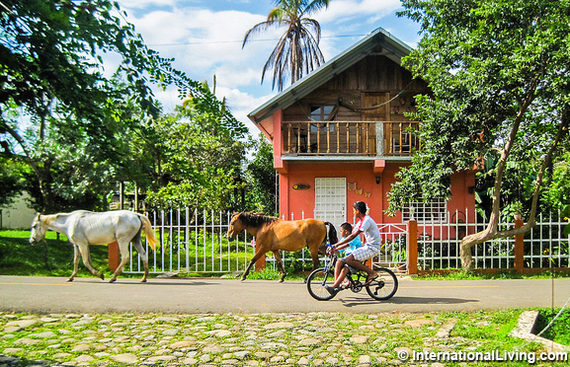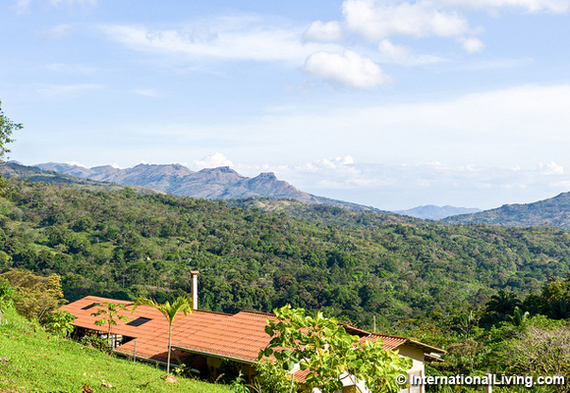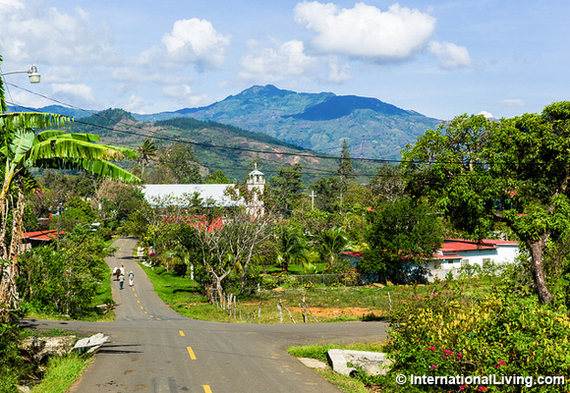By Linda Card, InternationalLiving.com
"People find Panama surprising," says Marianne Tobin, 76, of the country where she now spends much of her time. "Many think only of the canal zone or the beautiful tropical areas. They have no idea that Panama has pine trees and meadows reminiscent of Switzerland."
Children Cycling in Santa Fe, Panama
For Marianne and her son Jeff Owens, Panama had more than pine trees and meadows in store. The highlands of Veraguas are known for their coffee, thanks to a combination of warm weather, plenty of rainfall, rich soil, and abundant shade trees. Farmers around the rural town of Santa Fe have been growing coffee for generations. A large coffee processing plant sits in the middle of town, and the distinctive aroma of roasting beans drifts through the air. All this made Santa Fe the perfect spot for the two to own and operate a coffee farm in retirement.
"As a law enforcement professional back home, my job was my main focus and always very stressful. On top of that, the pace of life was very hectic where I lived in Southern California," says Jeff, 52. "Now I can work at my own pace. I'm outdoors all the time, living a healthy lifestyle, and it's very rewarding to work with the coffee plants and see the results.
"When I got to Santa Fe, it just felt right to me. I like the fact that this area is not as popular as other places in Panama. I feel there's more opportunity here. And the laws in Panama are similar to the U.S., particularly in regard to property rights."
In 2009, Jeff and Marianne bought an eight-acre farm in El Alto that sits at 2,400 feet on a gravel road outside Santa Fe. At the time, the farm had no buildings or functioning utilities.
The Santa Fe Countryside
Today Jeff and his Colombian fiancée, Karina Mesa, live full-time on the farm. Jeff has obtained permanent residence with a Friendly Nations Visa. This allows him to own and operate a business in Panama (though to apply, you also need at least $5,000 in a Panamanian bank account).
Marianne, a retired kindergarten teacher, maintains her residence in Huntington Beach, California. There she spends time with her other four children and 11 grandchildren. But she still travels to Santa Fe regularly and helps with the farm work while she's there.
With a population of about 3,200, Santa Fe is a rural, family-based community. It's home to a small but diverse group of expats from around the world, many of them with a passion for the natural world and healthy, organic living.
"People from the U.S. and other countries who come here have similar values and gravitate to places like Santa Fe," says Marianne. "You'll find that those who come here are keenly interested in protecting the environment and encouraging practices to sustain it."
As Jeff approached retirement, he did a lot of research, planning, and soul-searching. "I knew I'd be retiring from law enforcement in 2014," he says, "and I wanted to do something completely new, something I had never done before. I wanted to test myself and push myself in different ways."
Crossroads in Santa Fe, Panama
During Jeff's 30 years as a police officer in Southern California, he traveled a lot, often with his mother. "My mom is an avid traveler and we traveled to Costa Rica, Panama, and many other places together," Jeff says. "So when I thought about retiring, I knew I wanted to live overseas to have new experiences and adventures."
"A friend of Jeff's from the police department was from Panama and still had relatives living there, and she suggested looking into that country," says Marianne.
"I love to travel and went along for the fun. We visited Pedasí, Boquete, Volcán, and other places, and Jeff included Santa Fe on one trip. We both fell in love with a neglected, over-grown old coffee farm in the mountains above Santa Fe. When the tangle of forest was cleared away from the coffee bushes, we found that they were still bearing fruit. That kind of put everything in motion."
With the farm now up and running, Jeff and Karina make the hour-and-a-half drive to the provincial capital, Santiago, about once a week. There they handle their shopping, business, banking, and medical needs, as well as buying fuel for their pickup. Jeff estimates their monthly expenses to be around $1,000 or less, since they have no utility bills other than cell phone and internet service.
Jeff and Karina spend most of their time on the farm, but they are also active members of the Santa Fe community. They have close friends nearby with whom they share farming tips and special occasions. "We know all the other expats here and get together at one of the restaurants in town now and then," Jeff says. "We also have friends in Boquete who've had a coffee farm for many years and have shared their knowledge with us."
To start a coffee farm here, Jeff figures you need an initial investment of around $150,000. That would cover buying land, installing utilities, constructing a small building, and planting the coffee. This is good value over the long term. Marianne estimates that to do something similar in Southern California--growing citrus fruits instead of coffee, for instance--you might easily need twice as much.
Despite this, Jeff views settling in Santa Fe and establishing his coffee farm as a good decision. "Moving to Panama and starting this new venture has totally changed my life for the better. It's challenging, fulfilling, and we're always learning something new."
This article comes to us courtesy of InternationalLiving.com, the world's leading authority on how to live, work, invest, travel, and retire better overseas.
Related Articles
Retire to Panama's Highlands for $1,500 A Month
The 5 Benefits of Living in the Mountain Towns of Panama
8 Things to Do In Santa Fe, Panama
Earlier on Huff/Post50:

